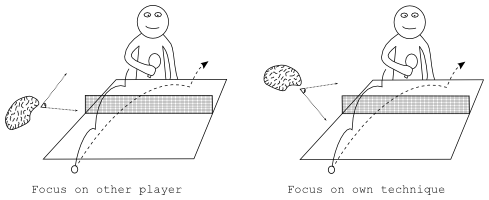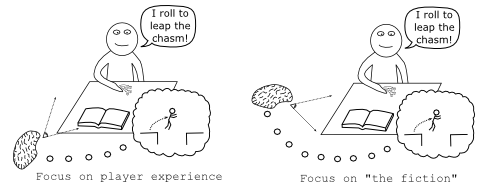The content below originally appeared on my now-defunct blog on June 28, 2013, I'm reposting it here because I wanted to reference it for a Twitter post for #RPGTheoryJuly. It's talking about a slightly-philosophical concept in RPG Theory / game design.
Tabletop RPG Theory Concept: Posture
A few weeks ago I was trying to teach my niece and nephew how to play ping pong. For anyone unfamiliar with the game, you use little rubber-covered wooden paddles, a bouncy ball, and a table with a net in the middle, and you get a point if you successfully hit the ball over the net with the appropriate number of bounces (once on each side for the first hit in the round, only one time on your opponent's side thereafter) and your opponent is unable to do the same back to you. As is natural while learning a new game they were very interested in figuring out how well they were doing, which they attempted to ascertain by asking “did I get a point for that?” a lot. I told them not to worry so much about whether they were getting points, but to just focus on their technique and getting the ball over the net with the appropriate number of bounces.
I did this because I couldn't remember at the time whether there was some interaction between winning points and who served in a round, but more importantly because the “and your opponent can't return it” part is such a huge factor in whether you score that it takes the focus of what you are doing, which is only realistic to focus on once you have solid enough fundamentals that you have a decent amount of control. If they wanted to be truly competitive they'd eventually need to learn how to take their opponent's capabilities into account (e.g. I have decent accuracy with my backhand but my forehand is terrible, so trying to get the ball to a place where I have to use my forehand to hit the ball is a good way to get a point against me), but for casual play and practicing basic skills they should focus on what they were doing and how that was interacting with the ball and the table. This casual interaction was enjoyable for all of us, especially since I'm not that great a player myself, but if I was more skilled and was looking at the game very competitively their capabilities would have loomed large: either I'd be getting hollow victories by beating opponents who couldn't play or I'd be patronizingly letting them win. It occurred to me that how much attention we're paying to our assessments of other participants has a big impact on the feel of a game, and I think it relates to an important concept for RPG design.

The term I'm picking to talk about this is Posture. Posture is about where and how participants stand with respect to a game (where I'm using “stand” metaphorically). The thing that most strongly controls this posture is what we're paying attention to or what we care about on a moment-to-moment basis. If I have a competitive posture in ping pong I care about winning and I need to pay attention to the capabilities of my opponent in addition to the bouncy-ball-physics element of the game. RPG mechanics can lead us to focus on things in ways that affect our Posture.
For example, both Fate and Mouse Guard have a mechanic where the GM sets a “target number” that players must “roll against” to see if they succeed or fail at a task, but there are big differences between them. In Fate, the GMing instructions tell you to set the target numbers relative to a character's skill so that you can orchestrate the experience of play: if you want the player to have a chance to “showcase their character's awesomeness” you give them a low difficulty number, if you think that have “too many” points of a spendable resource you give them a high difficulty number so they're likely to spend them to succeed. By contrast, in Mouse Guard the GM compares the fictional situation as-described against a series of factors in the rules for each skill: finding water in the wilderness is always the same difficulty, no matter whether the game been tense or leisurely, or whether the player is excited or reluctant. Fate wants the GM to focus on their moment-by-moment assessment of the player: what target number should I give them to provide the psychological jolt I think they need to get the best experience? Mouse Guard wants the GM to focus on filtering the fictional situation through the game procedures, presuming that faithfully engaging the process will produce the desired fun. Since the games put you in different postures for making this superficially-similar decision there is a difference in the subjective experience of play. And, since the people are a vital component of an RPG-in-operation, giving them different subjective experiences also impacts their behavior, which makes the games different in play.

Getting participants into the proper posture can have a big impact on RPG play. The GMing rules in Apocalypse World, for example, are largely about getting the GM into a posture so that they can comfortably make the decisions they need to make in that game. (There's also a rule about player posture: “play your character like they're a real person”, but it's less conspicuous and frequently ignored). A game like Primetime Adventures that's built around character-conflict tends to need players to lean in aggressively and can flounder if players adopt a more passive don't-rock-the-boat posture. In a sandbox-y “dynamic world” game the GM might be flummoxed if the players adopt an accommodating “we'll do what we think you want us to do, because we want to experience the story you planned” posture. Players bringing goals and ideas from other games can often give them an incompatible posture for a game: if a game expects you to be a self-directed goal-seeker but you're playing with a performative improv-actor “I'm trying to entertain everyone else” posture the game may break down.
While I'm saying that I think Posture is an important concept, I don't want to give the impression that I think it's simple or one-dimensional. In general, the posture players take has a huge impact on which directions they can experience tension or pressure without suffering excessive strain, which means that properly orienting the players' posture is an important part of game design. It seems to me that in the RPG design space we're just beginning to learn how to do this effectively, so I believe it's a fruitful area for further thought and exploration.
Congratulations @danmaruschak! You have completed the following achievement on the Steem blockchain and have been rewarded with new badge(s) :
You can view your badges on your Steem Board and compare to others on the Steem Ranking
If you no longer want to receive notifications, reply to this comment with the word
STOPTo support your work, I also upvoted your post!
Downvoting a post can decrease pending rewards and make it less visible. Common reasons:
Submit
This post was shared in the Curation Collective Discord community for curators, and upvoted and resteemed by the @c-squared community account after manual review.
@c-squared runs a community witness. Please consider using one of your witness votes on us here
Downvoting a post can decrease pending rewards and make it less visible. Common reasons:
Submit